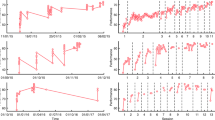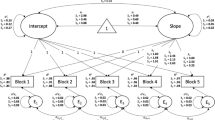Abstract
In the modern knowledge economy, success demands sustained focus and high cognitive performance. Research suggests that human cognition is linked to a finite resource, and upon its depletion, cognitive functions such as self-control and decision-making may decline. While fatigue, among other factors, affects human activity, how cognitive performance evolves during extended periods of focus remains poorly understood. By analyzing performance of a large cohort answering practice standardized test questions online, we show that accuracy and learning decline as the test session progresses and recover following prolonged breaks. To explain these findings, we hypothesize that answering questions consumes some finite cognitive resources on which performance depends, but these resources recover during breaks between test questions. We propose a dynamic mechanism of the consumption and recovery of these resources and show that it explains empirical findings and predicts performance better than alternative hypotheses. While further controlled experiments are needed to identify the physiological origin of these phenomena, our work highlights the potential of empirical analysis of large-scale human behavior data to explore cognitive behavior.



Similar content being viewed by others
References
Aubert, A., Costalat, R., Magistretti, P. J., & Pellerin, L. (2005). Brain lactate kinetics: Modeling evidence for neuronal lactate uptake upon activation. Proceedings of The National Academy of Sciences of The United States Of America, 102(45), 16448–16453.
Baumeister, R. F., Sparks, E. A., Stillman, T. F., & Vohs, K. D. (2008). Free will in consumer behavior: Self-control, ego depletion, and choice. Journal of Consumer Psychology, 18(1), 4–13.
Beedie, C. J., & Lane, A. M. (2012). The role of glucose in self-control: Another look at the evidence and an alternative conceptualization. Personality and Social Psychology Review, 16(2), 143–153.
Bélanger, M., Allaman, I., & Magistretti, P. J. (2011). Brain energy metabolism: Focus on astrocyte-neuron metabolic cooperation. Cell Metabolism, 14(6), 724–738.
Boksem, M. A. S., Meijman, T. F., & Lorist, M. M. (2005). Effects of mental fatigue on attention: An ERP study. Cognitive Brain Research, 25(1), 107–116. https://doi.org/10.1016/j.cogbrainres.2005.04.011.
Boksem, M. A. S., & Tops, M. (2008). Mental fatigue: Costs and benefits. Brain Research Reviews, 59(1), 125–139. https://doi.org/10.1016/j.brainresrev.2008.07.001.
Brown, A. M., & Ransom, B. R. (2007). Astrocyte glycogen and brain energy metabolism. Glia, 55(12), 1263–1271.
Cloutier, M., Bolger, F. B., Lowry, J. P., & Wellstead, P. (2009). An integrative dynamic model of brain energy metabolism using in vivo neurochemical measurements. Journal of Computational Neuroscience, 27(3), 391–414.
Danziger, S., Levav, J., & Avnaim-Pesso, L. (2011). Extraneous factors in judicial decisions. Proceedings of the National Academy of Sciences, 108(17), 6889–6892.
Ferrara, E., Alipoufard, N., Burghardt, K., Gopal, C., & Lerman, K. (2017). Dynamics of content quality in collaborative knowledge production. In: Proceedings of 11th AAAI international conference on web and social media. AAAI
Gailliot, M. T., & Baumeister, R. (2007). The physiology of willpower: Linking blood glucose to self-control. Personality and Social Psychology Review, 11(4), 303–327.
Gailliot, M. T., Baumeister, R. F., DeWall, C. N., Maner, J. K., Plant, E. A., Tice, D. M., et al. (2007). Self-control relies on glucose as a limited energy source: Willpower is more than a metaphor. Journal of Personality and Social Psychology, 92(2), 325–336.
Healy, A. F., Kole, J. A., Buck-Gengle, C. J., & Bourne, L. E. (2004). Effects of prolonged work on data entry speed and accuracy. Journal of Experimental Psychology: Applied, 10(3), 188–199.
Hodas, N. O., & Lerman, K. (2014). The simple rules of social contagion. Scientific Reports,. https://doi.org/10.1038/srep04343.
Hu, Y. B., & Wilson, G. S. (1997). A temporary local energy pool coupled to neuronal activity: Fluctuations of extracellular lactate levels in rat brain monitored with rapid-response enzyme-based sensor. Journal of Neurochemistry, 69(4), 1484–1490.
Huang, T. H., & Nikulin, V. (2014). Two algorithms under stochastic gradient descent framework for recommender systems (pp. 219–230). Cham: Springer. https://doi.org/10.1007/978-3-319-13186-3-21.
Inzlicht, M., Schmeichel, B. J., & Macrae, C. N. (2014). Why self-control seems (but may not be) limited. Trends in Cognitive Sciences, 18(3), 127–133.
Johnson, S.G.: The nlopt nonlinear-optimization package. https://nlopt.readthedocs.io/en/latest/.
Kalnishkan, Y., Adamskiy, D., Chernov, A., & Scarfe, T. (2015). Specialist experts for prediction with side information. In 2015 IEEE international conference on data mining workshop (ICDMW) (pp. 1470–1477). https://doi.org/10.1109/ICDMW.2015.161.
Killeen, P. R., Russell, V. A., & Sergeant, J. A. (2013). A behavioral neuroenergetics theory of ADHD. Neuroscience & Biobehavioral Reviews, 37(4), 625–657.
Kooti, F., Moro, E., & Lerman, K. (2016). Twitter session analytics: Profiling users’ short-term behavioral changes. In E. Spiro & Y. Ahn (Eds.), Proceedings of the 8th international conference (SocInfo2016) (pp. 71–86). Cham: Springer.
Kooti, F., Subbian, K., Mason, W., Adamic, L., & Lerman, K. (2017). Understanding short-term changes in online activity sessions. In Proceedings of the 26th international world wide web conference (companion WWW2017)
Kouchaki, M., & Smith, I. H. (2014). The morning morality effect. Psychological Science, 25(1), 95–102.
Kurzban, R., Duckworth, A., Kable, J. W., & Myers, J. (2013). An opportunity cost model of subjective effort and task performance. Behavioral and Brain Sciences, 36(06), 661–679.
Lange, F., & Eggert, F. (2014). Sweet delusion. Glucose drinks fail to counteract ego depletion. Appetite, 75(C), 54–63.
Lloyd-Smith, J. O., Schreiber, S. J., Kopp, P. E., & Getz, W. M. (2005). Superspreading and the effect of individual variation on disease emergence. Nature, 438(7066), 355–359.
Muraven, M., Tice, D., & Baumeister, R. (1998). Self-control as a limited resource: Regulatory depletion patterns. Journal of Personality and Social Psychology, 74(3), 774.
Nair, C., Prabhakar, B., & Shah, D. (2006). On entropy for mixtures of discrete and continuous variables. arXiv.org:cs/0607075v2
Pál, D., Póczos, B., & Szepesvári, C. (2010). Estimation of Rényi entropy and mutual information based on generalized nearest-neighbor graphs. arXiv:1003.1954
Pellerin, L., Bouzier-Sore, A. K., Aubert, A., Serres, S., Merle, M., Costalat, R., et al. (2007). Activity-dependent regulation of energy metabolism by astrocytes: An update. Glia, 55(12), 1251–1262.
Philip, P., Sagaspe, P., Moore, N., Taillard, J., Charles, A., Guilleminault, C., et al. (2005). Fatigue, sleep restriction and driving performance. Accident Analysis and Prevention, 37(3), 473–478.
Powel, M. (1998). Direct search algorithms for optimization calculations. Acta Numerica, 7, 287–336.
Rendle, S. (2012). Factorization machines with libfm. ACM Transactions on Intelligent Systems and Technology (TIST), 3(3), 57.
Schurr, A., & Gozal, E. (2011). Aerobic production and utilization of lactate satisfy increased energy demands upon neuronal activation in hippocampal slices and provide neuroprotection against oxidative stress. Frontiers in Pharmacology, 2, 96.
Shah, A. K., Mullainathan, S., & Shafir, E. (2012). Some consequences of having too little. Science, 338(6107), 682–685.
Sievertsen, H. H., Gino, F., & Piovesan, M. (2016). Cognitive fatigue influences students’ performance on standardized tests. Proceedings of the National Academy of Sciences, 113(10), 2621–2624.
Singer, P., Ferrara, E., Kooti, F., Strohmaier, M., & Lerman, K. (2016). Evidence of online performance deterioration in user sessions on reddit. PLoS One, 11(8), e0161636. https://doi.org/10.1371/journal.pone.0161636.
Vaupel, J. W., & Yashin, A. I. (1985). Heterogeneity’s ruses: some surprising effects of selection on population dynamics. The American Statistician, 39(3), 176–185.
Wyss, M. T., Jolivet, R., Buck, A., Magistretti, P. J., & Weber, B. (2011). In vivo evidence for lactate as a neuronal energy source. Journal of Neuroscience, 31(20), 7477–7485.
Xu, F., & Ding, H. (2007). A new kinetic model for heterogeneous (or spatially confined) enzymatic catalysis: Contributions from the fractal and jamming (overcrowding) effects. Applied Catalysis A: General, 317(1), 70–81.
Acknowledgements
This work was supported, in part, by AFOSR (contract FA9550-10-1-0569), by DARPA (contract W911NF-12-1-0034), by ARO (contract W911NF-15-1-0142), and IARPA (contract 2017-17042800005). The research described in this paper is also part of the Analysis In Motion Initiative at Pacific Northwest National Laboratory. It was conducted under the Laboratory Directed Research and Development Program at PNNL, a multiprogram national laboratory operated by Battelle for the US Department of Energy.
Author information
Authors and Affiliations
Corresponding author
Electronic supplementary material
Below is the link to the electronic supplementary material.
Rights and permissions
About this article
Cite this article
Hodas, N.O., Hunter, J., Young, S.J. et al. Model of cognitive dynamics predicts performance on standardized tests. J Comput Soc Sc 1, 295–312 (2018). https://doi.org/10.1007/s42001-018-0025-x
Received:
Accepted:
Published:
Issue Date:
DOI: https://doi.org/10.1007/s42001-018-0025-x




